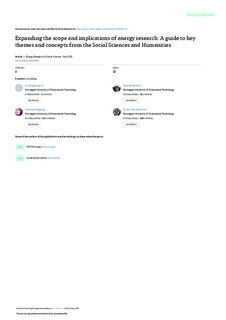| dc.contributor.author | Ingeborgrud, Lina | |
| dc.contributor.author | Heidenreich, Sara | |
| dc.contributor.author | Ryghaug, Marianne | |
| dc.contributor.author | Skjølsvold, Tomas Moe | |
| dc.contributor.author | Foulds, Chris | |
| dc.contributor.author | Robison, Rosie | |
| dc.contributor.author | Buchmann, Katrin | |
| dc.contributor.author | Mourik, Ruth | |
| dc.date.accessioned | 2020-02-20T09:23:38Z | |
| dc.date.available | 2020-02-20T09:23:38Z | |
| dc.date.created | 2020-01-02T11:19:20Z | |
| dc.date.issued | 2020 | |
| dc.identifier.issn | 2214-6296 | |
| dc.identifier.uri | http://hdl.handle.net/11250/2642780 | |
| dc.description.abstract | This paper provides an overview of key themes and concepts within energy-related Social Sciences and Humanities (energy-SSH) research in Europe. It aims to use this overview as an introduction for those producing strategies and interventions to advance energy and sustainability transitions in practice as well as for newcomers to the field of energy-SSH research, such as Science, Technology, Engineering and Mathematics (STEM) researchers. This paper builds on four extensive literature reviews from the EU Horizon 2020 SHAPE ENERGY project on four energy topics derived from the EU's Strategic Energy Technology Plan (EU SET-Plan) priorities: energy efficiency, low-carbon energy supply, energy system optimisation and transport decarbonisation. Based on a cross-cutting analysis of these four literature reviews, this paper discusses the evolution of and recent developments across energy-SSH research. It highlights two interrelated stories of scholarly expansion concerning the role of people in low-carbon energy transitions, illustrated with an example on demand-side management, and points towards future energy-SSH research and policy priorities. | nb_NO |
| dc.language.iso | eng | nb_NO |
| dc.publisher | Elsevier | nb_NO |
| dc.rights | Attribution-NonCommercial-NoDerivatives 4.0 Internasjonal | * |
| dc.rights.uri | http://creativecommons.org/licenses/by-nc-nd/4.0/deed.no | * |
| dc.title | Expanding the scope and implications of energy research: A guide to key themes and concepts from the Social Sciences and Humanities | nb_NO |
| dc.type | Journal article | nb_NO |
| dc.type | Peer reviewed | nb_NO |
| dc.description.version | publishedVersion | nb_NO |
| dc.source.volume | 63 | nb_NO |
| dc.source.journal | Energy Research & Social Science | nb_NO |
| dc.identifier.doi | https://doi.org/10.1016/j.erss.2019.101398 | |
| dc.identifier.cristin | 1765067 | |
| dc.description.localcode | © 2019 The Authors. Published by Elsevier Ltd. This is an open access article under the CC BY-NC-ND license. | nb_NO |
| cristin.unitcode | 194,62,40,0 | |
| cristin.unitcode | 194,64,25,0 | |
| cristin.unitname | Institutt for tverrfaglige kulturstudier | |
| cristin.unitname | Institutt for energi- og prosessteknikk | |
| cristin.ispublished | true | |
| cristin.fulltext | original | |
| cristin.qualitycode | 1 | |

